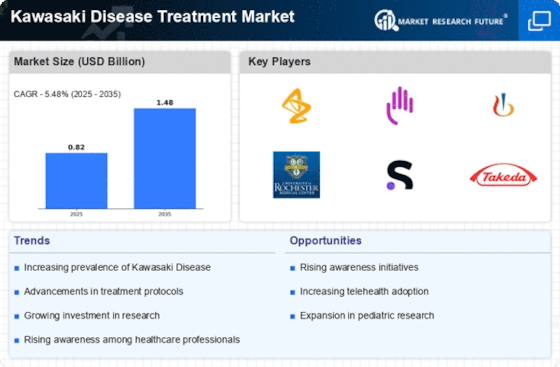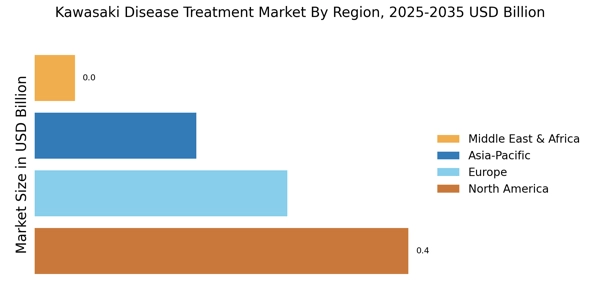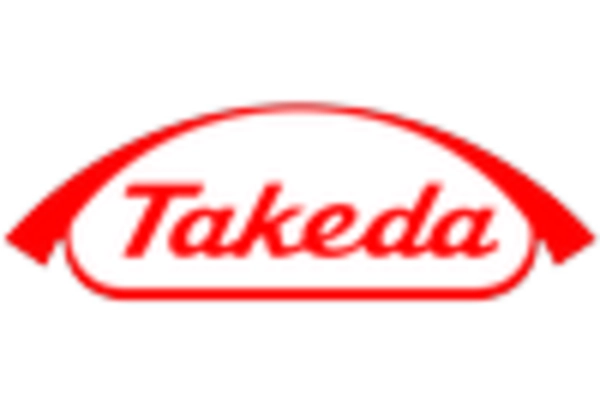Advancements in Treatment Protocols
The Kawasaki Disease Treatment Market is significantly influenced by advancements in treatment protocols. Recent developments in the understanding of the disease have led to improved treatment strategies, including the use of intravenous immunoglobulin (IVIG) and corticosteroids. These advancements have been shown to reduce the risk of coronary artery complications, which are a major concern in Kawasaki disease. As a result, healthcare providers are increasingly adopting these evidence-based treatment protocols, contributing to the growth of the Kawasaki Disease Treatment Market. Moreover, ongoing clinical trials and research initiatives are likely to yield new therapeutic options, further enhancing the treatment landscape. The integration of these advancements into clinical practice not only improves patient outcomes but also fosters a more robust market environment.
Rising Incidence of Kawasaki Disease
The Kawasaki Disease Treatment Market is experiencing growth due to the rising incidence of Kawasaki disease among children. Recent data indicates that the prevalence of this condition has been increasing, with estimates suggesting that approximately 8,000 to 12,000 cases occur annually in the United States alone. This uptick in cases necessitates effective treatment options, thereby driving demand within the Kawasaki Disease Treatment Market. As healthcare providers seek to address this growing health concern, the market is likely to see an influx of innovative therapies and treatment protocols aimed at improving patient outcomes. Furthermore, the increasing recognition of Kawasaki disease as a significant pediatric health issue is prompting further investment in research and development, which could lead to more effective treatment modalities.
Increased Funding for Pediatric Research
The Kawasaki Disease Treatment Market is benefiting from increased funding for pediatric research initiatives. Governments and private organizations are recognizing the need for more comprehensive studies focused on Kawasaki disease, which has historically received less attention compared to other pediatric conditions. This influx of funding is facilitating research into the etiology, pathophysiology, and treatment of Kawasaki disease, thereby enhancing the overall understanding of the condition. As a result, the Kawasaki Disease Treatment Market is likely to see the emergence of novel therapies and improved treatment guidelines. Furthermore, this financial support is fostering collaboration among researchers, healthcare providers, and pharmaceutical companies, which could lead to accelerated development and approval of new treatment options.
Emerging Biologics and Targeted Therapies
The Kawasaki Disease Treatment Market is poised for growth with the emergence of biologics and targeted therapies. Recent advancements in biotechnology have led to the development of novel therapeutic agents that specifically target the underlying mechanisms of Kawasaki disease. These biologics, which may include monoclonal antibodies and other innovative treatments, hold the potential to revolutionize the management of this condition. As research continues to unveil the complexities of Kawasaki disease, the Kawasaki Disease Treatment Market is likely to see an influx of these advanced therapies, which could offer improved efficacy and safety profiles compared to traditional treatments. The introduction of such targeted therapies not only enhances treatment options but also aligns with the broader trend of personalized medicine in pediatric care.
Growing Awareness Among Healthcare Professionals
The Kawasaki Disease Treatment Market is experiencing growth due to the increasing awareness among healthcare professionals regarding Kawasaki disease. Enhanced training and educational programs are being implemented to ensure that pediatricians and general practitioners can recognize the symptoms and initiate timely treatment. This heightened awareness is crucial, as early intervention is associated with better patient outcomes and reduced risk of long-term complications. As healthcare professionals become more knowledgeable about Kawasaki disease, the demand for effective treatment options is likely to rise, thereby propelling the Kawasaki Disease Treatment Market forward. Additionally, the establishment of guidelines and protocols by medical associations is further supporting this trend, ensuring that practitioners are equipped with the necessary tools to manage this condition effectively.

















